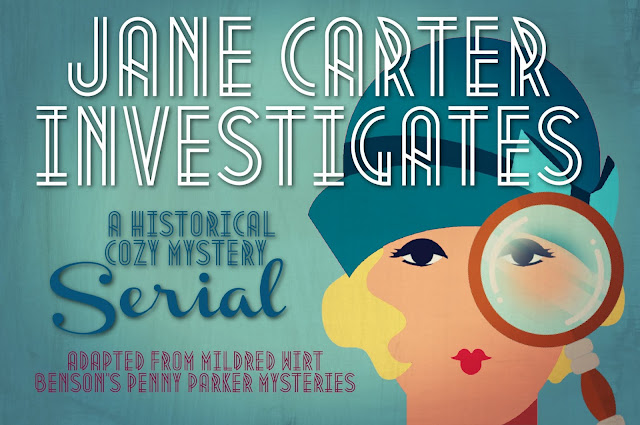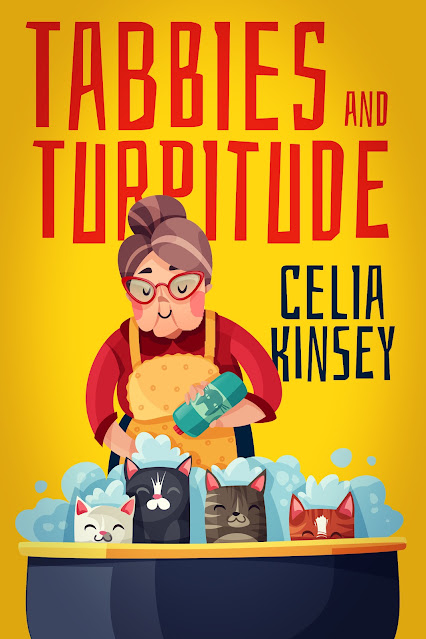Jane Carter Investigates Episode One-Hundred and Sixteen
“Well, Jane,” Dad said next morning at
the breakfast table. “I finally bought the cottage.”
“You bought a cottage?” I said. “Where?
When? Why?”
“I’ve been talking about it for the
past week, but you were so busy stealing the Examiner’s advertisers that
you never listened.”
“I’m all ears now, Dad,” I assured him,
absently reaching for another piece of toast. “Tell me all about it.”
“The cottage is located on the Grassy
River. Four rooms and a boathouse. Incidentally, I’ve hired a man to look after
the place and keep the boat in shape. He calls himself Anchor Jim.”
“Are you planning to live at the
cottage this summer?” I asked.
“No, I merely bought it for weekend
trips. I plan on a bit of fishing now and then. You may enjoy going with me.”
“Oh, Dad,” I groaned. “How can I? These
days I don’t even have time to wash my neck. Running a story paper is more work
than I anticipated.”
“I wasn’t aware you’d ever made washing
anything your top priority,” Dad said. “I’ll give you the address of the
cottage, at least. If you have any spare time during the next three months
drive out and look the place over.”
“I’ll get there somehow,” I promised,
pocketing the card. I pulled out a typed, folded sheet of paper which I placed
in front of my father. “Oh, by the way, sign this for me, will you?”
“No more checks.”
“This is only an order for a ton-roll
of paper. I’m trying to store up a few supplies so that eventually I can
publish Carter’s All-Story Weekly in
my own plant. I have the money in hand to cover the bill.”
Dad signed the order.
“Have you engaged your pressman yet?
Their wages come rather high, you know.”
“It takes everything the Weekly makes to meet its current bills.
But one of these days I’ll get the paper out in my own plant. Just wait and
see!”
“Have you heard back from Litchfield
Press yet?” Dad asked.
I told him that I had not. I did not
tell him that I was fast losing hope that the response, assuming I got one,
would be a positive one. I already had a bundle of rejection slips secreted in
my nightstand drawer. Litchfield Press really was my last hope for seeing Perpetua’s Promise in print.
Later, when I studied the address card
given to me by my father, I noticed that the new cottage was situated not far
from the Willows. Often, Florence and I had talked of calling upon Paul Firth,
but both of us had been kept busy at the Weekly
office and other responsibilities. Now that a linotype operator had been hired
to set type, we both had a little more free time. I decided that if I could get
Flo to accompany me, I’d visit both the new cottage and the Willows that
evening.
At four-thirty Flo and I were walking
through a dense maple and oak woods which rimmed the Grassy River. A breeze
stirred the tree leaves, but even so, the day was unseasonably hot and sultry.
“I wish it would rain,” remarked
Florence, trudging wearily beside me. “I never knew it to be so warm at this
time of year.”
“Maybe we can cool off by taking a boat
ride when we get to the cottage,” I said. “I think I see the place through the
trees.”
Directly ahead, in a tiny clearing,
stood a freshly painted white cottage. When we arrived at the front door, no
one seemed to be about, so we pushed it open and went in.
It was a tiny dwelling. The front door
opened into a long, skinny living room with a cobblestone fireplace, and beyond
that was the kitchen with a dining alcove. Off to one side were two minuscule
bedrooms.
When we went outside again, a short,
wiry man was coming toward the cottage from the river.
“You’re Miss Fielding?” he asked,
looking at Florence.
“No, I am,” I corrected him. “Or
rather, I used to be Miss Fielding. I’m Mrs. Carter these days, but you can
call me Jane. You must be Anchor Jim.”
Anchor Jim had a tattoo of a
four-masted sailing ship imprinted on his arm.
“That’s me,” the man said. “Go ahead
an’ look around all you like.”
Florence and I wandered about the
grounds, then returned to find Anchor Jim giving the motorboat, which was
upturned on the grass, a coat of varnish.
“We thought you might take us for a
ride,” I told him. “It must be cool on the water.”
“I sure would like to, Mrs.
Carter—Jane,” said Anchor Jim regretfully. “But I dasn’t get ’er wet now. Not
until this varnish dries.”
“You’re a sailor, aren’t you? Where
have you sailed?”
“The Atlantic, the Great Lakes, the
Gulf o’ Mexico. I’ve been everywhere.”
Flo and I chatted with Anchor Jim for a
time, but although we asked all manner of questions, we gained very little
definite information. The sailor seemed unwilling to tell anything about
himself, save in generalities.
“We may as well go on to Paul Firth’s
place,” I said to Flo. “It’s getting late.”
Anchor Jim’s varnish brush became
motionless. He glanced up sharply.
“I wouldn’t go there if I was you
gals,” he said.
“Why not?” I asked.
“The weather don’t look so good. She
might blow up a gale before sundown.”
“Oh, we’re not afraid of a little wind
or rain,” I said. “Come along, Flo.”
Anchor Jim said nothing more, but he
looked far from pleased that we were following through with our plans to visit
the Willows.
We walked a riverside path which I knew
would lead to the main road and Paul Firth’s farm.
“Odd sort, isn’t he?” I said to Flo as
we walked along.
“Anchor Jim?”
“Yes, I wonder where Dad found him. He
certainly didn’t tell us much about himself.”
We crossed the river by means of a
swaying suspension bridge and came out from beneath the solid canopy of tree
branches festooned with early spring leaves. I paused to look up at the sky.
“Aren’t those clouds odd? Just watch
them boil.”
“They must be filled with wind,” said
Flo. “Anchor Jim said he thought a storm would blow up.”
“It’s not far away, either. Unless we
step right along, we’ll surely get caught in it.”
“Perhaps we should forget the Willows
and start for home.”
“We wouldn’t make it before the storm
breaks,” I said. “If we hurry we may reach Firth’s place before it gets truly
unpleasant.”
We hurried along the winding path. The
air remained sultry and very still. The sky had changed to a peculiar yellowish
color.
I watched, with increasing alarm, as a
writhing, twisting, funnel-shaped arm reached down from the boiling clouds,
anchoring them to earth. For a moment the entire mass seemed to settle and
flatten out.
“Listen!” I said to Flo.
There was a sullen, deep-throated roar
as the storm moved forward.
“A tornado!” gasped Florence. “It’s
coming this way!”
“Run!” I said, seizing Flo’s hand. “We
still have a chance to make Firth’s place. Hopefully he has a storm cellar.”
A white farmhouse, a red barn and a
silo stood at the back of a weed-infested field. Clearly, Mr. Firth was no
farmer. One side of the property was bounded by the willow-rimmed river, the other
by the road.
Flo and I crawled beneath a barbed-wire
fence and cut across the field. The sky was darker now and the roar of the wind
ominous. The tail of the funnel whipped along the ground, veering to the south,
then coming toward us again.
“We’ll never make the house,” I said.
“Let’s hunker down here in this ditch.”
“We can make it,” Flo insisted, “but
only if we run.”
Flo raised another wire strand for me
to roll beneath. The sleeve of my dress caught on the sharp barbs, tearing a
large hole as I jerked free.
Dust had begun to blow. Trees and
bushes bowed before the first gusts of wind.
I glanced frantically about for a place
of refuge. A low, circular cement hump rose from the ground not many yards
distant. It as an old-fashioned storm cellar.
“We’ll get in there, Flo!” I shouted.
“Come on!”
We ran across the yard to the cave. The
entrance was guarded by a door built in the side of the cement dome. A brass
padlock hung unsnapped in the hasp.
“Thank goodness, we can get in,” gasped
Florence. “Hurry!”
I tugged at the heavy door. It would
not raise, and then it gave so suddenly that I nearly tumbled backward.
The door clattered back against the
cement dome. Through the rectangular opening protruded the head and shoulders
of Paul Firth. His face was convulsed with rage.
“What are you trying to do?” he demanded. “Speak up!”



Comments
Post a Comment